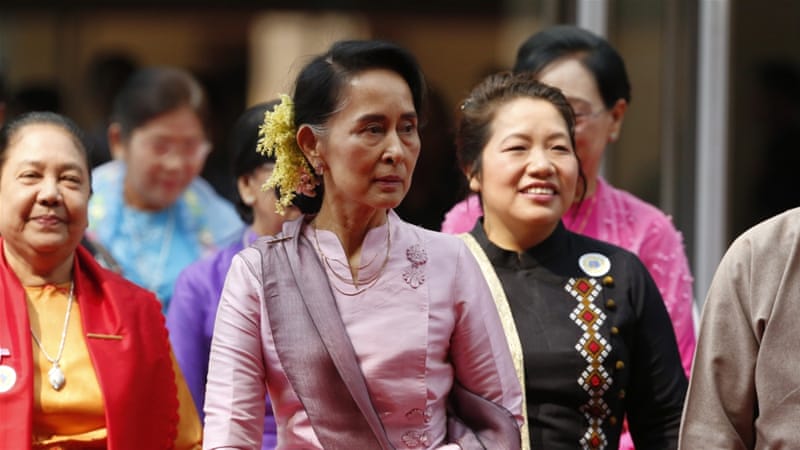It was the year 2015 and a beacon of light appeared to shine for Myanmar. After decades of fighting against the military, the National League for Democracy won the General Elections by a landslide under the leadership of Aung San Suu Kyi. By 2016, the army and the party entered into a power agreement that propelled Myanmar into a civilian-led government with democracy as a strong anchor.
It has been two years since Myanmar was ushered into the threshold of democracy along with all the rights and liberties it comes with. The democratic electoral win was viewed as a promising one especially as it had Aung San Suu Kyi as its de facto leader. However, Myanmar is yet to function as a democracy, far from it, in fact.
The Rohingya Crisis, which has been labeled as a ‘Humanitarian Crisis’, is occurring in the newly democratic country of Myanmar. Moreover, it is occurring under the leadership of Aung San Suu Kyi who for more than a decade held the reputation of being this global icon for democracy. The atrocities directed towards the Rohingyas has been described by the UN Human Rights Commissioner as, “textbook ethnic cleansing”. Journalists and Reporters have given accounts of the brute treatment meted out to this minority group by the military junta which includes physical abuse, sexual violence, and arson. The government of Myanmar and Suu Kyi are yet to roll out reforms to curb the growing refugee crisis.

Aung San Suu Kyi has received international criticism for her silence on the matter since 2012. In the year 2012, she delivered a speech at Oslo for the Nobel Peace Prize she was awarded almost twenty years ago. In the speech she said,
“Ultimately our aim should be to create a world free from the displaced, the homeless and the hopeless, a world of which each and every corner is a true sanctuary where the inhabitants will have the freedom and the capacity to live in peace.”
The statement stands as a sharp contrast to the communal violence outbreak that occurred in Myanmar shortly after her speech. The Rohingyas are a minority Muslim group in Myanmar who occupy the state of Rakhine. They have been denied citizenship by the government and are not acknowledged as people by the rest of the country. The Rohingyas have always faced discrimination and communal violence; traces of their migration out of Myanmar can be mapped back to the 90’s. The atrocities committed on them has, however, in recent years reached extreme levels and has led to the “fastest growing refugee crisis”.
The displacement of the Rohingyas continues to this day with many of them seeking shelter in Bangladesh, Indonesia, and other neighbouring countries. The state of Rakhine continues to face gross human rights abuse with the remaining Rohingyas there undergoing torture, sexual abuse, arson, and killings. The death toll is reaching numbers so large that terms such as “Genocide” are being used to describe it. In the face of all this, Suu Kyi remains silent on the matter, and it is baffling, to say the least.

Aung San Suu Kyi fought for the political and peaceful reform of her country for 15 years and in those years her conviction and determination never wavered. They were in no way the easiest years. She was subjected to house arrests a total of three times in 15 years, and spent most of that time in solitary confinement. When she first joined the political struggle in 1988, after a mass uprising against the military junta, she decided on a non-violence approach, emulating the paths that great freedom fighters like Nelson Mandela and Mahatma Gandhi took. In that same year, she co-founded the National League for Democracy and held rallies and protests all over the country. She garnered mass support and more than 50,000 people would gather to hear her speeches.
Suu Kyi, who is the daughter of a nationalist who played a huge role in the exit of the British from Myanmar (then Burma), felt a responsibility towards her country and on speaking after the 1988 mass uprising said, “I could not as my father’s daughter remain indifferent to all that was going on.”
She immersed herself deeply in her cause and was viewed by the rest of the world as a brave symbol for her resistance and soon became known as “The Lady”. Her allegiance to the struggle and the country was so deep-rooted that even when she was given permission to visit her husband in the UK, who was suffering from terminal cancer, she made the decision to not go, in fear that she would not be allowed to return back to her country.
It comes as a surprise to now see the heroine of democracy take such a fall from grace. While her supporters believe her inaction towards the crisis has solely to do with her not wanting to upset the Junta, not when some amount of progress has been made in taking Myanmar to greener pastures. The rest of the world have critiqued her for avoiding to address the issue. Her tact may be to function as a pragmatic politician, but her shift from a Human Rights Defender to a leader who is allowing such lengths of violence to occur right under her nose, makes one question and wonder who the real Aung San Suu Kyi is.

